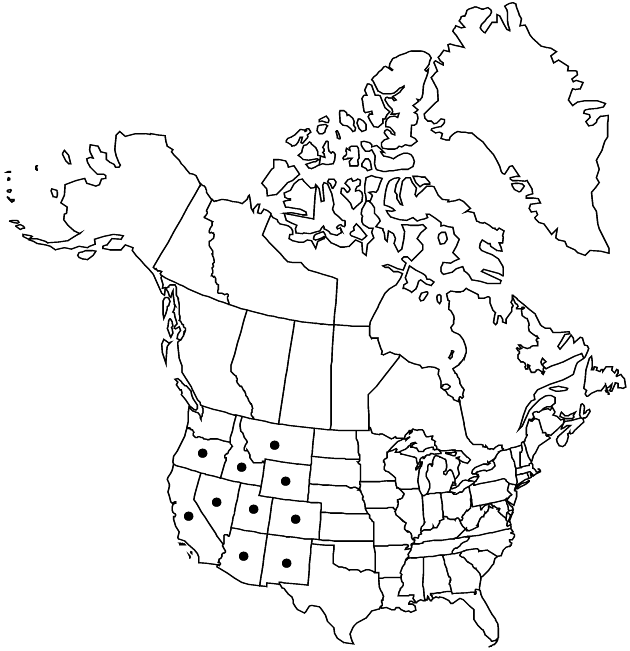Difference between revisions of "Ericameria nauseosa var. oreophila"
Phytologia 78: 64. 1995.
FNA>Volume Importer |
FNA>Volume Importer |
||
| Line 15: | Line 15: | ||
|name=Chrysothamnus nauseosus var. artus | |name=Chrysothamnus nauseosus var. artus | ||
|authority=(A. Nelson) Cronquist | |authority=(A. Nelson) Cronquist | ||
| − | }}{{Treatment/ID/Synonym | + | }} {{Treatment/ID/Synonym |
|name=Chrysothamnus nauseosus subsp. consimilis | |name=Chrysothamnus nauseosus subsp. consimilis | ||
|authority=(Greene) H. M. Hall & Clements | |authority=(Greene) H. M. Hall & Clements | ||
| − | }}{{Treatment/ID/Synonym | + | }} {{Treatment/ID/Synonym |
|name=Chrysothamnus nauseosus var. consimilis | |name=Chrysothamnus nauseosus var. consimilis | ||
|authority=(Greene) H. M. Hall | |authority=(Greene) H. M. Hall | ||
| − | }}{{Treatment/ID/Synonym | + | }} {{Treatment/ID/Synonym |
|name=Chrysothamnus oreophilus var. artus | |name=Chrysothamnus oreophilus var. artus | ||
|authority=A. Nelson | |authority=A. Nelson | ||
| − | }}{{Treatment/ID/Synonym | + | }} {{Treatment/ID/Synonym |
|name=Ericameria nauseosa var. arta | |name=Ericameria nauseosa var. arta | ||
|authority=(A. Nelson) G. L. Nesom & G. I. Baird | |authority=(A. Nelson) G. L. Nesom & G. I. Baird | ||
| − | }}{{Treatment/ID/Synonym | + | }} {{Treatment/ID/Synonym |
|name=Ericameria nauseosa subsp. consimilis | |name=Ericameria nauseosa subsp. consimilis | ||
|authority=(Greene) G. L. Nesom & G. I. Baird | |authority=(Greene) G. L. Nesom & G. I. Baird | ||
| Line 38: | Line 38: | ||
}}<!-- | }}<!-- | ||
| − | --><span class="statement" id="st-undefined" data-properties=""><b>Plants </b>70–250 cm. <b>Stems</b> greenish, usually leafy, compactly tomentose. <b>Leaves</b> yellowish green; blades 1-nerved, filiform to linear, 20–50 × 0.8–1 mm, faces glabrate. <b>Involucres</b> 6.5–10 mm. <b>Phyllaries</b> 11–20, apices erect, acute, glabrous. <b>Corollas</b> 6–9 mm, tubes glabrous, lobes 1.5–2.5 mm, glabrous; style appendages shorter than or equaling stigmatic portions. <b>Cypselae</b> hairy (sometimes glabrous in Idaho populations); pappi 4.2–7.6 mm. <b>2n</b> = 18 (as Chrysothamnus nauseosus subsp. consimilis).</span><!-- | + | --><span class="statement" id="st-undefined" data-properties=""><b>Plants </b>70–250 cm. <b>Stems</b> greenish, usually leafy, compactly tomentose. <b>Leaves</b> yellowish green; blades 1-nerved, filiform to linear, 20–50 × 0.8–1 mm, faces glabrate. <b>Involucres</b> 6.5–10 mm. <b>Phyllaries</b> 11–20, apices erect, acute, glabrous. <b>Corollas</b> 6–9 mm, tubes glabrous, lobes 1.5–2.5 mm, glabrous; style appendages shorter than or equaling stigmatic portions. <b>Cypselae</b> hairy (sometimes glabrous in Idaho populations); pappi 4.2–7.6 mm. <b>2n</b> = 18 (as <i>Chrysothamnus</i> nauseosus subsp. consimilis).</span><!-- |
-->{{Treatment/Body | -->{{Treatment/Body | ||
| Line 45: | Line 45: | ||
|elevation=1200–3000 m | |elevation=1200–3000 m | ||
|distribution=Ariz.;Calif.;Colo.;Idaho;Mont.;Nev.;N.Mex.;Oreg.;Utah;Wyo.;Mexico (Baja California). | |distribution=Ariz.;Calif.;Colo.;Idaho;Mont.;Nev.;N.Mex.;Oreg.;Utah;Wyo.;Mexico (Baja California). | ||
| − | |discussion=<p>The names Chrysothamnus nauseosus subsp. consimilis and var. consimilis (Ericameria nauseosa subsp. consimilis) have been used for this taxon; an equivalent combination has not been made at the varietal level in Ericameria. Variety oreophila intergrades with vars. mohavensis and speciosa.</p> | + | |discussion=<p>The names <i>Chrysothamnus</i> nauseosus subsp. consimilis and var. consimilis (<i>Ericameria nauseosa</i> subsp. consimilis) have been used for this taxon; an equivalent combination has not been made at the varietal level in <i>Ericameria</i>. Variety oreophila intergrades with vars. mohavensis and speciosa.</p> |
|tables= | |tables= | ||
|references= | |references= | ||
| Line 69: | Line 69: | ||
|publication year=1995 | |publication year=1995 | ||
|special status= | |special status= | ||
| − | |source xml=https://jpend@bitbucket.org/aafc-mbb/fna-data-curation.git/src/ | + | |source xml=https://jpend@bitbucket.org/aafc-mbb/fna-data-curation.git/src/8f726806613d60c220dc4493de13607dd3150896/coarse_grained_fna_xml/V19-20-21/V20_115.xml |
|tribe=Asteraceae tribe Astereae | |tribe=Asteraceae tribe Astereae | ||
|genus=Ericameria | |genus=Ericameria | ||
Revision as of 15:18, 18 September 2019
Plants 70–250 cm. Stems greenish, usually leafy, compactly tomentose. Leaves yellowish green; blades 1-nerved, filiform to linear, 20–50 × 0.8–1 mm, faces glabrate. Involucres 6.5–10 mm. Phyllaries 11–20, apices erect, acute, glabrous. Corollas 6–9 mm, tubes glabrous, lobes 1.5–2.5 mm, glabrous; style appendages shorter than or equaling stigmatic portions. Cypselae hairy (sometimes glabrous in Idaho populations); pappi 4.2–7.6 mm. 2n = 18 (as Chrysothamnus nauseosus subsp. consimilis).
Phenology: Flowering late summer–fall.
Habitat: Alkaline valleys and plains
Elevation: 1200–3000 m
Distribution

Ariz., Calif., Colo., Idaho, Mont., Nev., N.Mex., Oreg., Utah, Wyo., Mexico (Baja California).
Discussion
The names Chrysothamnus nauseosus subsp. consimilis and var. consimilis (Ericameria nauseosa subsp. consimilis) have been used for this taxon; an equivalent combination has not been made at the varietal level in Ericameria. Variety oreophila intergrades with vars. mohavensis and speciosa.
Selected References
None.